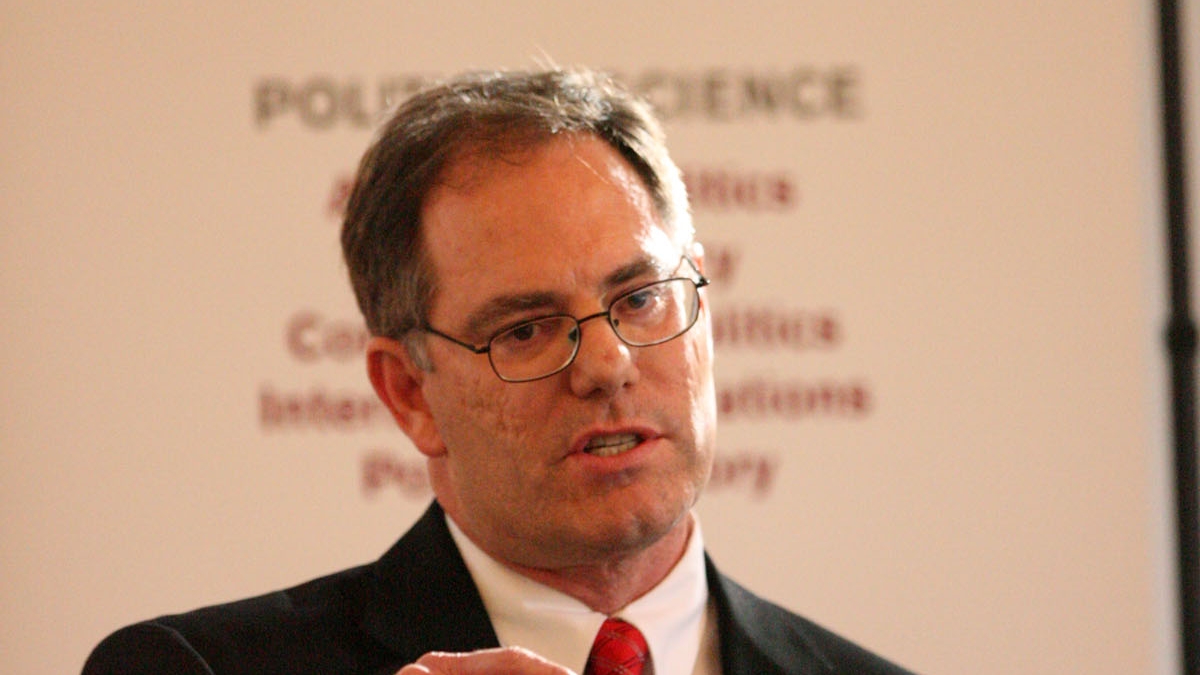New ASU school marries politics and global studies

ASU’s new School of Politics and Global Studies “sits at the intersection of two of the key ideals of the New American University: access and excellence,” said Patrick Kenney, founding director of the school, during a launch ceremony Jan. 27.
“We have (these ideals) in the students and in the faculty,” said Kenney, a political scientist who joined ASU in 1986 and was named chair of the Department of Political Science in 2002.
Established last year through action by the Arizona Board of Regents, the new school combined two academic units in the College of Liberal Arts and Sciences: the political science department and the School of Global Studies.
“It is fantastically appropriate and modern that we brought these two (fields of study) together, because they’re inseparable,” said ASU President Michael Crow. “America is now but a part of the broader global context with all that we bring to the table. So American politics and global politics are inseparable; American political affairs and global political affairs are inseparable.
“From my perspective, this is a fantastic opportunity,” Crow said, adding it also is an important step for the university as it continues to evolve intellectually.
Crow, a political scientist by background, drew comparisons between the complexities of human interactions in the social sciences and the complexities of “the things people refer to as the hard sciences,” including the origins of the universe and cosmology.
“We’re just getting started at understanding those things that are the most complex, which are our own interactions, our own theories about ourselves, our own understanding of knowledge, and cognition and power and politics and decision making,” he said.
“So it seems very timely to me and very important that we continue to evolve our intellectual enterprise and its structure and design,” Crow said, referring to the marrying of the fundamental understanding of politics with global studies and all its complexities in this new school.
ASU Executive Vice President and Provost Elizabeth D. Capaldi said the new school was “a fantastic combination” that keeps the traditional disciplines as well as the transdisciplines.
“We need those identities to be strong,” she said, complimenting the faculty and leadership of the school for their work in coming together with this transformative enterprise.
Quentin Wheeler, ASU vice president and dean of the College of Liberal Arts and Sciences described the school as “the latest expression of creative and transdisciplinary progress in the college and the new American University.
“We are here to redefine the study of politics and global engagement,” Wheeler said.
“One of the great challenges of the university of the 21st century is to educate a new generation of scholars and citizens who understand political philosophy and to appreciate the intersections of politics with culture, law, science and technology,” he said. “It’s also a challenge to educate students who comprehend the importance of scalable solutions from local to national and to international.”
During the ceremony, Kenney provided several data sets to explain the dynamics of the new school. He noted the following student data, which underscores the combination of access and excellence:
• More than 5,500 ASU students were enrolled in classes in the School of Politics and Global Studies last fall.
• There are 1,600 students enrolled as majors in the school.
• One-quarter of freshman and sophomore majors are first generation students.
• Some 213 of the school’s majors (13 percent) are also students in Barrett, the Honors College.
• During the past two years, 15 percent of ASU’s Fulbright Scholars were majors in the school.
• The most recent Truman Scholar and Marshall Scholar was a major in the school.
• Since last May, nearly 200 students are involved with internships, in the U.S. (Supreme Court, White House, Department of Commerce) and around the world in 38 countries.
The talented faculty in the school, according to Kenney, represent 10 disciplines: political science, anthropology, sociology, geography, law, economics, environmental studies, history, engineering and planning.
Additionally, the faculty conduct research in 23 languages and use research methodologies that run the gamut from qualitative to quantitative. They’ve received research grants from the Ford Foundation, MacArthur Foundation, Guggenheim Foundation, Smith Richardson Foundation, National Science Foundation, U.S. Department of Energy and U.S. Air Force.
The school also is delivering a competitive doctoral program with small seminars and one-on-one education, Kenney said. There are 39 doctoral students and 12 master’s students who are receiving external grants and publishing while in the program.
The school is organized into two faculties, each with a faculty head. Carolyn Warner has the faculty leadership role for political science and Douglas Webster for global studies.
Also providing remarks during the ceremony was Linda Lederman, dean of social sciences. She emphasized “the leadership that faculty have shown and the practicing of democracy” in the establishment of the new school.
“The kind of collegiality and intellectual exchange that is going on” has turned early talks about “possibilities” for the new school into a welcoming home for students and faculty, and in particular, a welcoming place for junior faculty, Lederman said.
“None of this could have happed without the wonderful faculty and particularly without the leadership of Pat Kenney,” she added.
In addition to the ceremony, earlier in the day, the school hosted the first in a series of lectures given by members of the National Academy of Sciences. Robert Keohane, professor of international affairs at Princeton University, presented a lecture on the international politics of climate change.
The next lecture in the series is scheduled for 2:30 p.m., Feb. 5 in the Memorial Union, Alumni Lounge. National Academy of Sciences member John Ferejohn, of New York University’s School of Law, will talk about the rise of constitutional adjudication in the postwar world.
Additional information about the lecture series and the School of Politics and Global Studies is online at http://pgs.clas.asu.edu or 480-965-6551.